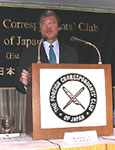Richard C. Koo's FCCJ Talk about Balance Sheet Recession
Takahiro MIYAO (Professor, GLOCOM)
 Richard C. Koo, Chief Economist of Nomura Research Institute, gave a luncheon speech titled "The Real Story Behind Japan's Deflation" at the Foreign Correspondents' Club of Japan on Thursday, September 4, 2003. His talk was largely based on his new book "Balance Sheet Recession" (J. Wiley & Sons, 2003): http://www.wiley.com/WileyCDA/WileyTitle/productCd-0470821167.html Richard C. Koo, Chief Economist of Nomura Research Institute, gave a luncheon speech titled "The Real Story Behind Japan's Deflation" at the Foreign Correspondents' Club of Japan on Thursday, September 4, 2003. His talk was largely based on his new book "Balance Sheet Recession" (J. Wiley & Sons, 2003): http://www.wiley.com/WileyCDA/WileyTitle/productCd-0470821167.html
His main points during the talk were much the same as those in his article "Preemptive Strike to Deal with Balance-Sheet Recession": http://www.glocom.org/opinions/essays/200212_koo_preemptive/
At the same time, he emphasized "too much misunderstanding or misreporting outside Japan regarding the real cause of Japan's economic illness" on this occasion, because the audience was mostly foreign correspondents. First, according to Mr. Koo, there is a myth that Japan's recession is caused by structural problems on the supply side. Deflation is deepening, and interest rates are the lowest in history, but there are very few borrowers in the financial market. Most Japanese corporations are paying down debts in spite of virtually zero interest rates. All this shows that it is not a supply problem but a demand problem, essentially caused by a collapse of asset prices in the early 1990s, leading to the balance-sheet recession in Japan.
Mr. Koo said that contrary to typical reporting in the foreign press, it is not "zombies" but good companies that are causing the demand problem and deflation tendencies, because good companies are not borrowing money but rather paying down debts while zombies are more or less "neutral" because they have no money to repay their debts. In this situation the government is the only entity that can borrow money to spend in order to fill the gap between supply and demand, according to Mr. Koo.
He also emphasized the fact that the wealth lost due to the collapse of the stock and real estate markets in Japan during the last decade is much more than the wealth lost in the US during the depression. However, the Japanese economy somehow managed to avoid a complete collapse of the macro-economy in spite of such horrendous loss of wealth and, therefore, most people are not aware of how much wealth was actually lost in Japan. It is for this reason that the current recession is called the "bankers' and managers' recession", since only those two groups of people are aware of the actual state of the balance sheets. This situation has not been recognized, especially outside Japan.
Neither has it been reported in the foreign press that not a single bank applied for public funds, at least initially, when the government tried to inject money into the banking system in order to avoid a credit crunch in 1997-98, and that therefore the government had to make adjustments and set aside management issues in order for banks to come forward to accept public funds. As a result, there has been misunderstanding among foreign observers that government officials and bankers conspired to misuse public funds to bail out failing banks in Japan, according to Mr. Koo.
Mr. Koo also maintained that after the collapse of the IT bubble and the corporate accounting mess, the U.S. economy appears to be showing some signs of a balance-sheet recession, and some Asian economies such as Taiwan and Hong Kong have been suffering from asset deflation. He said he would like those economies to learn from Japan's experience and to make use of fiscal stimulus as an effective means to deal with the balance-sheet recession.
After his talk there were many questions raised by foreign correspondents. One correspondent asked him about his opinion on the recent recovery in the stock market. Mr. Koo replied that the recent increase was not enough at all to offset the past decline in asset values, and warned that the government should not become too complacent in its fight against deflation. Another correspondent pointed out to him that there is not much accurate information available in the first place regarding banks' non-performing loan problem in Japan, especially for reporting by foreign press, which might have contributed to non-reporting of some of the important facts in this area as Mr. Koo mentioned.
| 




